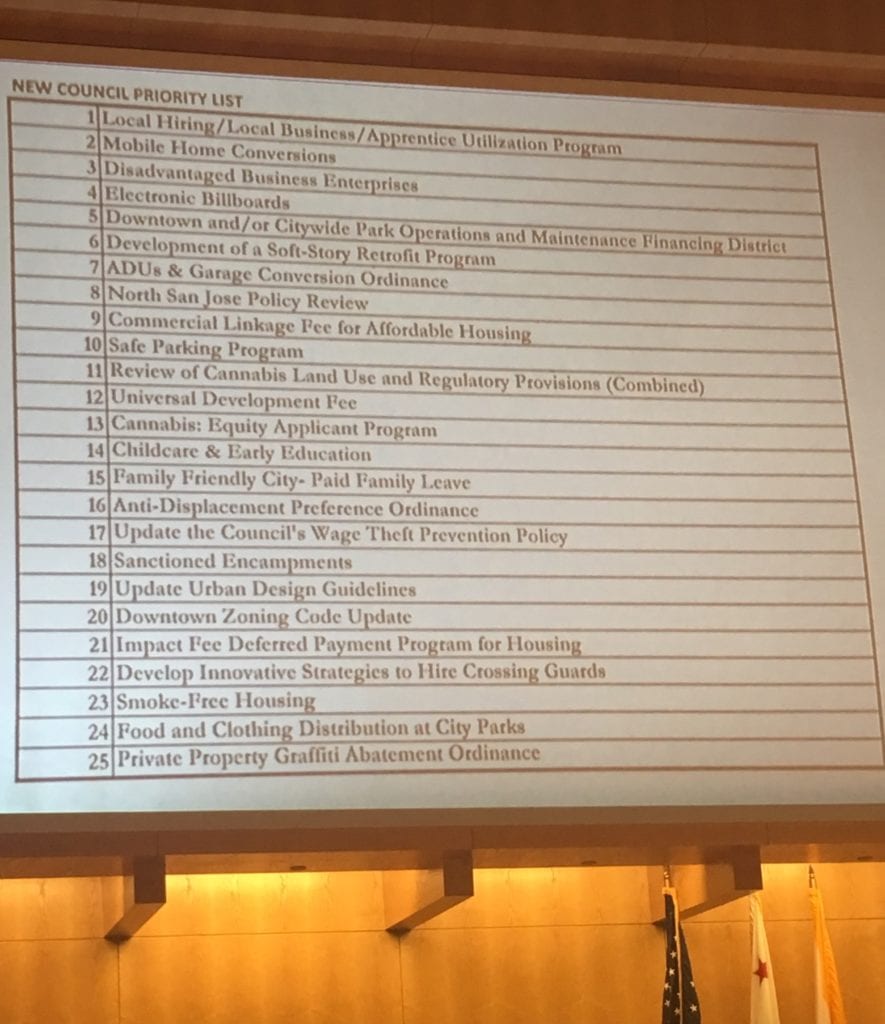After tallying the votes, San Jose lawmakers locked in six new policy priorities for next year at Tuesday’s San Jose City Council meeting.

Prior to the meeting, councilors nominated over two dozen ideas to pave the way for city officials to manage their works load and put the council’s most important initiatives first. Tuesday’s vote to add six new items to the list updates the council’s previous 27 priorities that were set in Oct. 2017. Each councilor received eight votes to spread across the nominations.
The City Council’s new priorities are as followed:
- Paid Family leave, as submitted by Councilmember Sylvia Arenas
As part of her Family Friendly City Initiative, Arenas wants to provide at least six weeks of paid family leave for the “birth, adoption, foster placement of a child, or child-parent bonding regardless of the gender, marital status or sexual orientation of the parent.”
Who voted for it? Councilmembers Sergio Jimenez, Raul Peralez, Magdalena Carrasco, Dev Davis, Maya Esparza, Pam Foley and Arenas
- Childcare and Early Education, as submitted by Mayor Sam Liccardo
According to Liccardo’s nomination, there are fewer than 17,000 child care spots available in the city. To solve the problem, the mayor wants to incentivize the development of child care facilities and improve the process of permitting them.
“I believe that our early childhood support is connected to housing insecurity,” Councilmember Maya Esparza said in support of Liccardo’s nomination. “This can help stabilize some of our families in San Jose.”
Who voted for it? Liccardo, Vice Mayor Chappie Jones, Councilmember Lan Diep, Peralez, Carrasco, Davis, Esparza and Arenas.
- Universal development fee, as submitted by Liccardo
“Applicants must inquire with multiple departments and staff to fully estimate the fees for their project and this ‘bureaucratic pinball’ creates unnecessary delay, confusion and barriers to construction,” Liccardo said in his nomination form.
Part of his proposal is to create a universal development fee that will include all current development tax and impact fees. He added that the initiative would make it “easier to understand and estimate” fees on new development.
Who voted for it? Liccardo, Jones, Diep, Carrasco, Davis, Esparza, Foley and Khamis.
- Cannabis land use and regulatory provisions, a combined nomination from Councimembers Magdalena Carrasco, Raul Peralez, Maya Esparza and Pam Foley.
City staff recommended combining three of the councilmembers cannabis nominations that dealt with land use issues.
Esparza proposed that staff evaluate the high concentration of cannabis businesses in district seven and whether the city could cap the number. Foley was interested in reopening the dispensary registry that is currently capped at 16 shops citywide. Carrasco and Peralez proposed allowing dispensaries in Edenvale, North San Jose and the International Business Park, as well as allowing the sale of individual cannabis licenses and businesses.
Who voted for it? Jimenez, Peralez, Diep, Carrasco, Davis, Esparza, Arenas, Foley and Khamis.
- Cannabis equity program, as submitted by Carrasco and Peralez
The second part of Carrasco and Peralez’s cannabis-related initiative would establish a cannabis equity program. Based on a state law, the idea aims to reduce barriers for minorities, the economically disadvantaged and previously incarcerated individuals who want to get into the thriving industry.
During the meeting, Peralez noted that the cannabis proposals are the only nominations that would make the city money through tax revenue.
A last-minute letter from Planning, Building and Code Enforcement Director Rosalynn Hughey and San Jose Police Department Chief Edgardo Garcia seemed to discourage the prioritization of any cannabis-related initiative, however.
“Based upon the current staffing levels in the Division of Cannabis Regulation at the Police Department, staff only has the bandwidth to focus on its current mission; the Division does not have the bandwidth to oversee the additional items,” the letter read.
Who voted for it? Jones, Jimenez, Peralez, Carrasco, Arenas and Foley.
- Update the council’s wage theft prevention policy
The initiative to garner the most support from members of the public was wage theft. The city currently has a wage theft law in place, however, labor advocates argue that it’s not broad enough and does not protect construction workers and contracted public works projects.
“Wage theft is rampant in the construction industry,” lawyer and human rights advocate Ruth Silver Taube told San José Spotlight. “These workers are exploited by unscrupulous developers and shady contractors. This update will protect construction workers and law abiding contractors, and we urge the city to make it a priority.”
Who voted for it? Jimenez, Peralez, Diep, Carrasco, Esparza and Arenas.

An unconventional meeting
The meeting was not without some rule bending, however.
Liccardo revealed that he and Peralez violated the Brown Act, which prohibits councilmembers from discussing public business behind closed doors. He noted that Peralez approached him with a question about the Childhood and Early Education initiative that he answered.
City Attorney Rick Doyle could not be reached for comment.
Carrasco submitted a late nomination for the priority list on Monday morning. According to city documents, nominations were due Feb. 8. The council voted unanimously to allow the last-minute addition which dealt with a one percent development fee that would go to public art. Her initiative did not receive enough votes to make the priority list.
“Art reduces blight, art reduces violent crime,” Carrasco said. “For some communities it also represents safety, it also represents a sense of belonging.”
Contact Grace Hase at [email protected] or follow @grace_hase on Twitter.


Leave a Reply
You must be logged in to post a comment.